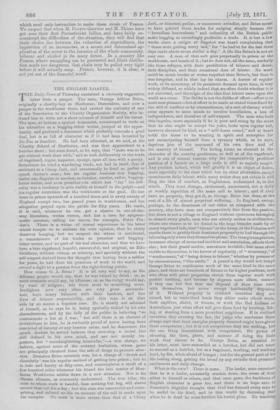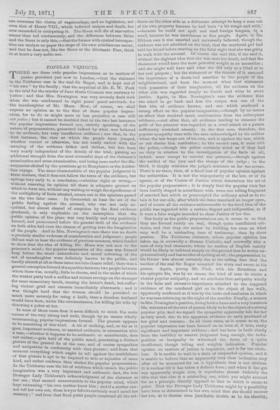THE ENGLISH LOAFER.
"TIIE Daily News of Thursday contained a curiously suggestive letter from a pauper. The man, George Atkins Brine, • originally a charity-boy at Sherborne, Dorsetshire, and now a pauper in the workhouse there, had excited the curiosity of one of the Secretaries to the Charity Organization society, who in- duced him to write out a short account of himself and his career. The man, at bottom a cynical humourist, accustomed to trade on his education as a hogging-letter writer, jumped at the oppor- tunity, and produced a document which probably conceals a good deal, but is as full of character as if it had been invented by De Foe or Smollett. He had been educated, as we said, at the Charity School of Sherborne, and was then apprenticed to a butcher there ; but soon found, as he says, that "more was to be got without work than with," and so took deliberately to the trade of vagabond, rogue, impostor, sponge, upon all men with a penny. Sometimes he tried a wandering trade, not bad in itself, that of assistant to a Cheap Jack, and occasionally he lived as pedlar or quack doctor's man ; but his regular business was begging, under one disguise or another, as butcher, currier, sailor, begging- letter writer, and even preacher—in which last " lay " his diffi- culty was a tendency to grin visibly at himself in the pulpit—and his regular recreation was the workhouee or the gaol. He has been in prison upwards of a hundred times and in every county of England except two, has passed years in workhouses, and has altogether preyed upon the public for fifty years. He reads, it is said, whenever he can get a chance in out-of-the- way literature, writes verses, and has a turn for epigram- matic sarcasm, calling his razors, for example, Peter Pin- flax's. There is a whine of unreal repentance in his letter which tempts us to endorse his own opinion, that he richly deserves hanging, but we suspect the whine is accidental, a reminiscence of his trades as preacher and begging- letter writer, and no part of his real character, and that we have here a true vagabond, hopeful, resourceful, and original, an Edie Ochiltree, without virtues or sobriety, and specially without the self-respect derived from the thought that having been a soldier for years, he had done his quantum of work in the world, and earned a right to a pension from the right-feeling public.
How comes G. A. Brine ? It is all very well to say, as the Alliance people would say, that he was ruined by drink ; or, as most overseers would say, by idleness ; or, as the clergy would say, by want of religion ; but there must be something more. lereligious men very often are very great accumula- tors, have heavy balances with their bankers, and live lives of intense respectability, and this man is on that side by no means a hopeless case. He is clearly not ashamed of himself, as he says he is, being cynically tickled by his own shamelessness, and by the folly of the public in believing "so consummate a liar as I was ; " but still there is an element of truthfulness in him, he is evidently proud of never having been convicted of larceny or any heavier crime, and he denounces the quack doctors he served because they over-step a moral line still defined in his own mind, and are not merely im- postors, but " manslaughtering housicides,"—a true charge, we believe, against some of the country herbalists, whose gains are principally obtained from the sale of drugs to procure abor- tion. Drunken Brine certainly was, for a charge of drunk and disorderly' was his regular method of getting into prison ; but he is hale and hearty at fifty-nine, and contemplates a stroll of a few hundred miles whenever his friend the late master of Sher- borne Workhouse settles down in a new situation. Nor is his disease idleness, as commonly understood. The true idler, the man to whom work is hateful, does nothing but beg, will starve sooner than toil for a day ; but this man was resourceful and enter- prising, and refused no life on account of the call it made upon his energies. No work is more severe than that of a Cheap Jack, or itinerant pedlar, or racecourse swindler, and Brine seems to have quitted these trades for cadging simply because the "boundless benevolence" and imbecility of the British public make begging so exceedingly profitable a trade. It is but a few weeks since a cadger at Bagshot was heard complaining that "times were getting werry 'ard," for "ho hadlit for the last three days made above seven shillin' a day." A life like Brine's is not an easy ono. A man of that sort goes perpetually to prison or the workhouse, and boasts of it ; but he does not, all the same, cordially like those refuges, with their prohibition of tobacco and drink,' their discipline, and their occasional dose of labour. No work could be much harder or worse requited than Brine's, but then it was irregular, and in that lay its charm. A horror of regular work, of its monotony, of its persistent demand upon time, is very widely diffused, so widely indeed thet we often doubt whether it is not universal, and the origin of the idea that labour came upon the world as a curse. The dislike is not the dislike of effort—effort is to most men pleasant—but of effort to be made at stated times fixed by the will of another or by circumstances, of a sort of slavery which even appears to some minds to involve humiliation, a loss of independence, and therefore of self-respect. The man who feels this impulse, more especially if he is poor and stung by the sense that he also ought to accept the yoke, looks upon regular toil, however elevated its kind, as a "mill-horse round," and at heart holds the horse to be wanting in spirit and enterprise for not emancipating 'himself from a tyranny which, as he says, deprives liim of the command of his own time and of the mastery of himself. The feeling forms an element in the character of the country gentleman, as well as of the vagabond, and is one of several reasons why the comparatively profitless position of a farmer on a large scale is still so eagerly sought.' Any position indeed, which will gratify ibis an object of desire, more especially to the class which has no other alternative except monotonous daily labour, while many rather than not obtain it will fling the idea of comfort, as Englishmen understand it, to the winds. They want change, excitement, amusement, not a daily or weekly repetition of the same call to labour ; and if they have no property, they get it, as George Brine has done, at the cost of a life of almost perpetual suffering. In England, owing, perhaps, to the dreariness of our cities as compared with the country, city-born men are comparatively free from the passion, but there is not a village in England without specimens belonging to almost every grade, men who are utterly useless in civilization, whose one chance is to be found in the huge blunder made by so many vagabond lads, that "the sea" or the Army, or the Colonies will enable them to gratify their dominant propensity to loaf through life labouring only when they themselves please. The tramp's temptation, incessant change of scene and incident and association, affects them also ; but their grand motive, sometimes invisible, but more often visible to themselves, is the horror of regularity, of " monotony," of "confinement," of "being driven to labour," whether by persons or by circumstances, "like cattle." A pound a day would not tempt George Brine to continuous .work of the same kind in the same place, and there are hundreds of Brines in far higher positions, men who often with great properties shrink from regular work with perfect loathing, and become by degrees mere idlers, content if they can but feel that the disposal of their time rests with themselves, but never except ineideutally disposing of it. Without property • in civilized countries they are ruined, but in uncivilized lands they either make others work, their captives, slaves, or women, or work like Red Indians or Australians, just when effort will give them food by hunting, fish- ing, or stealing from a more provident neighbour. If in civilized countries they overstep the law, the judge who condemns theta always says that their energies properly directed might have given them competence ; but it is not competence they are seeking, but the one thing inconsistent with competence, the power of choosing the time, place, and manner of doing the little work they choose to do. George Brine, as revealed in his letter, must have succeeded as a butcher, but did not want to succeed as a butcher, but as a vagabond, working, and working hard, by fits, when afraid of hunger ; but for the greater part of his life loafing along, getting his bread by any swindle that promised excitement and daily change.
What is the cure ? There is none. The loafer, once conecious that he is a loafer, necessarily crushes down the sense of duty either to himself or others, and that once gone, the backbone of English character is gone too, and there is no hope save is Emerson's frightful thought that God has doomed every man to be useful • to his kind, and in this world by decreeing that when he is dead he must fertilize his burial-place. No teachiug
can overcome the charm of vagabond age, and no legislation, not .even that of Henry VIII., which inflicted stripes and death, has 'ever succeeded in extirpating it. The Sioux will die of starvation sooner than toil continuously, and the difference between Brine and the Sioux is only this,—that the former with cynical introspec- tion can analyze on paper the steps of his own mischievous career, and that he does not, like the Sioux or the dilettante Peer, think it at heart a very noble one.































 Previous page
Previous page